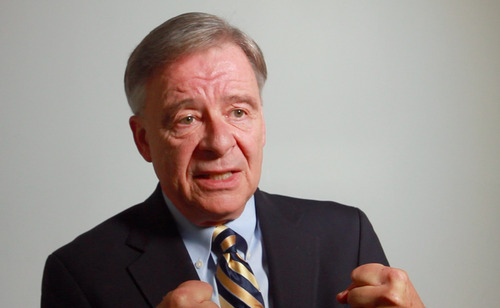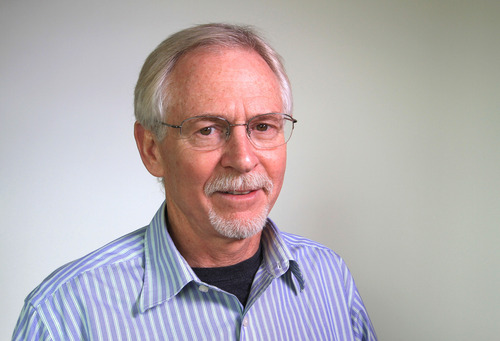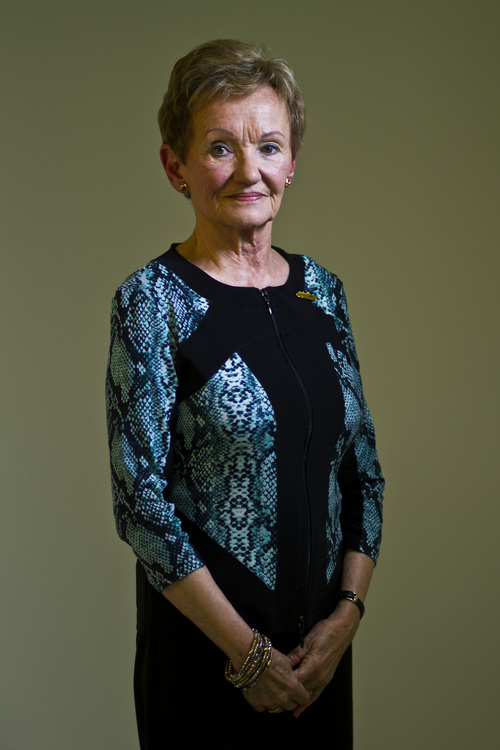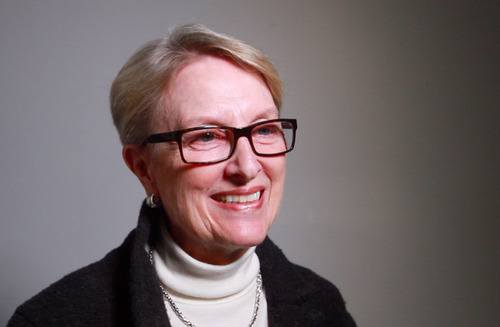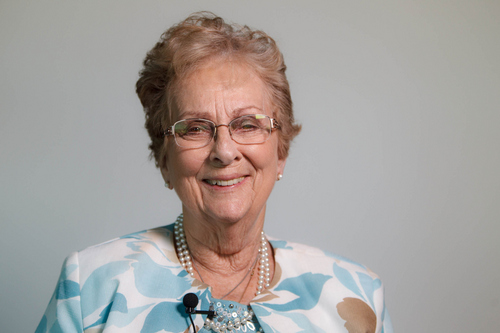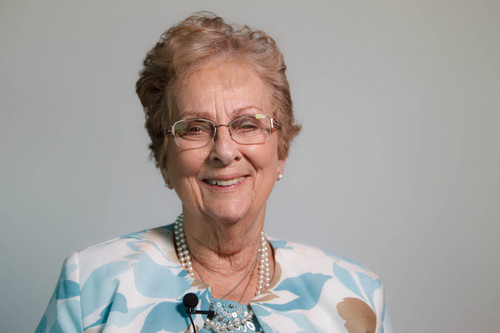This is an archived article that was published on sltrib.com in 2013, and information in the article may be outdated. It is provided only for personal research purposes and may not be reprinted.
It was 1,000 days of promise as a sense of optimism swept across the country.
A new and charismatic president, John F. Kennedy, called on a young generation to engage a bold era. A media romance ensued — some remember it as a sunny postcard called Camelot.
A half century later, many Utahns, Republicans and Democrats alike, look back on the Kennedy years with fondness for the time and for the handsome, young president who, right from the start, challenged Americans to "ask not what your country can do for you — but what you can do for your country" at his Jan. 20, 1961, inauguration.
Longtime Midvale Mayor JoAnn Seghini recalls her young family at that time and how they identified with Kennedy, his charming wife, Jackie, and their two children, Caroline and John Jr. "It was a sign the presidency was part of the people. And he inspired the people to be responsible for change," she said. "It gave us all a sense of responsibility. It made a big difference."
It all came to a shattering halt, of course, shortly after noon Nov. 22, 1963, when JFK was assassinated in Dallas. Americans were left with the image of Jackie Kennedy's blood-spattered suit as she stood beside a glum looking Vice President Lyndon Johnson taking the oath of office inside Air Force One. And then there was the shocking Zapruder film of the shooting itself.
The country was suddenly and permanently changed — less hopeful and more cynical, said environmental activist and former Salt Lake City Councilwoman Deeda Seed.
"Even though I was only 1 [year old] when he was assassinated, it did inform the development of my childhood," she said, noting her parents' devotion to Kennedy. "It was one of those moments when there was a before and an after. For my parents, it was a loss of innocence."
—
The unrealized promise • During the past 50 years, Americans have learned the Kennedys were more complicated than Jack and Jackie's Camelot might suggest.
The president had sexual appetites that some called, at the least, reckless. And there are alleged connections between Kennedy's father, Joseph, to dark figures, among myriad subplots kept quiet by the attorney general and president's brother, Bobby Kennedy, who himself would fall to an assassin's gun in 1968. Those factors, among others, keep the JFK assassination-conspiracy theories percolating.
Even so, through the prism of five decades, Kennedy's presidency still shines. His untimely death froze him in the country's psyche as the tanned, 46-year-old can-do chief executive. It has left novelists, journalists, historians and everyday Americans wondering the big "what if" — what if Kennedy had lived? What would the world look like if he had won and finished a second term?
In the early months of his administration, he created the Peace Corps, announced an astonishing plan to land Americans on the moon by decade's end and reaffirmed U.S. support for then-divided Germany in the face of a communist menace. Two years later, on June 26, 1963, he gave a rousing speech on the west side of the Berlin Wall, throwing down the gauntlet to the Soviet Union. His words — the most famous ever uttered in German by any American — sent a wave of hope across Europe and reverberated here at home:
"Today in the world of freedom, the proudest boast is 'Ich bin ein Berliner.' "
Utah playwright David Kranes recalled the time as a new beginning — for him, the country and the free world — that came to a harsh, cruel ending.
"My life was opening up hugely. The rhetoric of John Kennedy and the mystique of John Kennedy ran parallel to all that," he said. "And then to just have it taken away. I wondered if it was some kind of a sign for what might happen to me. ... I wish he'd been able to play out his role. And I wonder how Bobby would have played out his. But that's been taken from us."
Even former Sen. Jake Garn, R-Utah, has kind remembrances of JFK. As a conservative, Garn said he agreed with few of Kennedy's liberal domestic policies. But Garn said he liked the young president's style, especially on foreign policy.
"Coming from a rich family, I think he had a feeling for so-called ordinary people," Garn said. "His reputation was being a liberal. But I would describe it as being practical. He was willing to listen and learn."
Only weeks in office, Kennedy refused to provide air bombardment promised by the CIA for an invasion at the Bay of Pigs by disaffected Cuban exiles who had fled Castro's revolution. It was a huge debacle and the young president's first crisis. The CIA and Pentagon brass were furious.
Eighteen months later, in October 1962, a wiser, more confident Kennedy ordered a naval quarantine to stop further shipment of Soviet nuclear missiles to Cuba. Gen. Curtis LeMay, Air Force chief of staff, pushed for bombing the island nation. The superpowers looked to be staring into the nuclear abyss. But Kennedy brokered a behind-the-scenes deal that would quietly remove U.S. missiles from Turkey. The Soviets withdrew their nuclear weapons from Cuba. In the eyes of Americans, the president looked courageous and victorious. But within the corridors of power, LeMay and others, including the CIA, took it as another sign of Kennedy's weakness.
—
Civil wrongs and rights • Retired Salt Lake City history teacher Stan Holmes, who fought in Vietnam and in the late 1970s headed up the MX Information Center — which opposed a massive missile system proposed in Utah and Nevada — sees Kennedy's legacy as "mixed."
"He sparked positive feelings and inspired a generation of young Americans," Holmes said. "But he was a Cold Warrior. And the downside of that is he ramped up the arms race with 1,000 new Minuteman missiles."
Beyond that, JFK expanded the U.S. military presence in Vietnam with 12,000 additional advisers, Holmes noted. And it was during the Kennedy administration that the CIA allegedly orchestrated the Nov. 2, 1963, assassination of South Vietnamese President Ngo Dinh Diem.
"He put us on the track to escalation [in Vietnam]," Holmes said.
In hindsight, Americans would see that Kennedy's 1960 election over Republican Vice President Richard Nixon heralded the coming of a tumultuous decade. That certainly was the case in the civil-rights movement, said Jeanetta Williams, president of the Salt Lake branch of the NAACP, who recalled an era of violence and heartbreak.
In October 1962, Kennedy used the threat of federal force to ensure that James Meredith, a black man, was admitted to the University of Mississippi. And, in June 1963, he nationalized the Alabama National Guard in a showdown with Gov. George Wallace surrounding the entry of two black students, Vivian Malone and James A. Hood, into the University of Alabama.
"Part of the legacy of President Kennedy was his speech on civil rights on June 11, 1963," Williams said. "People were saying, 'be patient,' and Kennedy was being pushed by both sides. But when he saw the urgency of Dr. Martin Luther King [Jr.], the president spoke out."
In that live televised speech, Kennedy left little question about where he stood on civil rights and elevated the push for equality to a "moral issue," one as "old as the scriptures and ... as clear as the American Constitution."
"This nation was founded," he said, "on the principle that all men are created equal, and that the rights of every man are diminished when the rights of one man are threatened."
But the next day, civil-rights leader Medgar Evers was gunned down outside his home in Jackson, Miss. On Sept. 15 of that year, the 16th Street Baptist Church in Birmingham, Ala., was bombed, killing four young black girls. On April 4, 1968, King was assassinated in Memphis, and barely two months later, Bobby Kennedy, fresh off a victory in the California Democratic primary, was murdered in Los Angeles, ending his quest to become the 37th president and picking up where his older brother had left off.
—
Legacy of inspiration • JFK, the 35th president, found himself tied to inherited issues, such as civil rights and the Cold War, observed KUED documentarian Ken Verdoia. "He is constantly walking fine lines. He is deeply aware of the struggles of civil rights. But troubled by Southern Democrats who were against voting rights. And the South was key to his re-election."
In Vietnam, too, Kennedy was balancing involvement between "Domino Theory" anti-communist hawks and the notion that the Southeast Asian country held little in the way of national interest for the U.S. Even before he was elected president, Kennedy warned against a ground war in Southeast Asia.
"He wanted to balance the Cold War and he wanted to balance Vietnam" in an effort to avoid larger conflicts, Verdoia said.
But Kennedy's real talent was inspiring others. "He was gifted at crafting a sense of destination," Verdoia explained. "What he was less adept at was the mechanics of getting to that destination."
Much of what Kennedy sought was left to Johnson to finish, particularly on poverty and civil rights. Johnson, in contrast to his slain predecessor, served 12 years in the House and 12 years in the Senate before being selected as JFK's running mate. And, unlike Kennedy, Johnson was exceptionally talented at getting his agenda through Congress.
But LBJ lacked the Kennedy charisma. Former Rep. Karen Shepherd, D-Utah, found JFK's style and message irresistible.
"I was in college, and Kennedy came to town. It was very exciting," she recalled. "We had a poster of him on the ceiling at the Tri-Delta House [at the University of Utah]. He was a big deal."
Shepherd worked on Kennedy's Utah campaign and turned toward public service.
"I think of the Peace Corps and how he got young people to tramp through [foreign] countries to help less-fortunate people," she said. "It changed lives and continues to change lives."
Kennedy also had a big impact on former Salt Lake City Mayor Ted Wilson, who heeded the president's call, switched his college major and turned to public service. But Wilson now finds it difficult to define a Kennedy legacy because "he wasn't around long enough to get a good result."
Although Americans can take lessons from Kennedy's example, Wilson said, they may be difficult to apply to present-day politics and social norms.
"I look back on it like seeing a good movie or reading a good book," said the one-time Democratic gubernatorial and Senate candidate. "But we're a different country in a different time, and the Kennedy thing only goes so far. If he were here today, I don't know that he would do much better than [President Barack] Obama."
But former Republican Gov. Olene Walker isn't so sure that Kennedy shouldn't again be raised as an example to move the political times forward.
" 'Ask not what your country can do for you, but what you can do for your country' is such a marvelous sentiment," she said. "It is a statement that can apply at any level. We have shifted to thinking not what is best for the nation or the state, but what is best for the party. And that is a huge mistake."
Kennedy's call for service is a sentiment that need not be silenced by gunshots in Dallas.
csmart@sltrib.com Jan. 20, 1961 • Takes oath as 35th U.S. president.
March 1, 1961 • Signs executive order creating the Peace Corps
April 20, 1961 • Takes responsibility for the failed Cuba invasion at the Bay of Pigs
Oct. 1, 1962 • Ensures James Meredith, a black student, is admitted to the University of Mississippi
Oct. 16, 1962 • Establishes naval quarantine to stop Soviet missile shipments to Cuba
Nov. 20, 1962 • Calls for middle-class tax cut to boost economy
June 11, 1963 • Mobilizes Alabama National Guard to admit two black students to University of Alabama
June 26, 1963 • Gives "Ich bin ein Berliner" speech in West Berlin
Oct. 7, 1963 • Signs Limited Nuclear Test Ban Treaty
Nov. 22, 1963 • Is assassinated in Dallas


